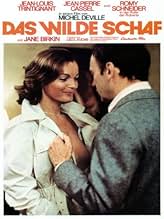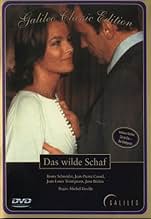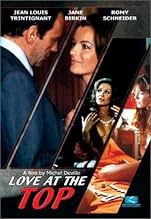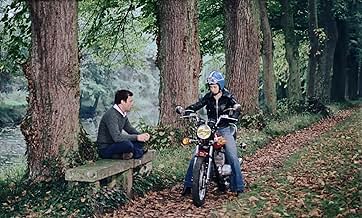Le mouton enragé
- 1974
- Tous publics
- 1h 45min
NOTE IMDb
6,7/10
2,2 k
MA NOTE
Une tragi-comédie cynique centrée sur les différentes manières d'aimer à l'époque de la révolution sexuelle.Une tragi-comédie cynique centrée sur les différentes manières d'aimer à l'époque de la révolution sexuelle.Une tragi-comédie cynique centrée sur les différentes manières d'aimer à l'époque de la révolution sexuelle.
- Réalisation
- Scénario
- Casting principal
Avis à la une
A middle-age man (Jean-Louis Tritignant) picks up a pretty young woman (Jane Birkin). When he finds out she's a prostitute, he slaps her into submissiveness and then "rapes" her. She ends up adoring him for it, and he discovers his strange powers over beautiful women.Encouraged by his scheming friend (Jean-Pierre Cassel), a crippled, unsuccessful writer, he uses his seductive powers to seduce the wife of a business associate (Romy Schneider), and embarks on a campaign of shady land deals and political intrigue.
This movie works best if you take it as a satire or absurdist comedy. The character's strange power over incredibly beautiful woman is especially ludicrous. Most men would volunteer their left testicle to sleep with Jane Birkin and their right one to sleep with Romy Schneider; they would then be left castratti if they went on to seduce the likes of Florinda Bolkan (as a bisexual political power broker)and Estelle Blain (as a vapid movie star) as Tritigant's character does here. In one of the funniest scenes, the hero has to, in order to close a deal, either sleep with a wealthy woman who is "older than God" or marry an 18-year-old heiress. Hilariously, the young girl is eager to jump into bed with him, but refuses to consider marriage, so he has to make the ultimate sacrifice.
This is definitely a very black comedy which takes a lot of tragic and violent turns at the end, but in typical French (i.e. decidedly non-Hollywood)fashion it refuses to provide a tidy moral at the end or make its hero too sympathetic. As for the literal translation of the French title, "The Angry Sheep", I'm still trying to figure that one out.
This movie works best if you take it as a satire or absurdist comedy. The character's strange power over incredibly beautiful woman is especially ludicrous. Most men would volunteer their left testicle to sleep with Jane Birkin and their right one to sleep with Romy Schneider; they would then be left castratti if they went on to seduce the likes of Florinda Bolkan (as a bisexual political power broker)and Estelle Blain (as a vapid movie star) as Tritigant's character does here. In one of the funniest scenes, the hero has to, in order to close a deal, either sleep with a wealthy woman who is "older than God" or marry an 18-year-old heiress. Hilariously, the young girl is eager to jump into bed with him, but refuses to consider marriage, so he has to make the ultimate sacrifice.
This is definitely a very black comedy which takes a lot of tragic and violent turns at the end, but in typical French (i.e. decidedly non-Hollywood)fashion it refuses to provide a tidy moral at the end or make its hero too sympathetic. As for the literal translation of the French title, "The Angry Sheep", I'm still trying to figure that one out.
Michel Deville quietly left us and this world a few weeks ago, and his disappearance would have gone unnoticed, for me at least, if some television stations had not marked the sad event by programming some of his films. A contemporary and colleague of the formidable New Wave generation, Deville was an interesting and quite prolific director. Somewhat more conservatory in style than his more famous colleagues, he was bolder in his choice of themes, making (and sometimes writing) films about unusual relationships between men and women, set in social environments where corruption and ambiguity are rule. He was also considered an excellent 'director of actors', so that the names of most of the famous French actresses and actors of the eras in which he created appear on the credits of his films. 'Le Mouton enragé' (the English distribution title is 'Love at the Top'), released in 1974, is one such example. I chose to see the film for its formidable cast, and I discovered an interesting movie, a story of social ascension through unusual means that could not have been brought to the screen in this way today, and which, if ever a 'remake' is made, will look completely different.
Nicolas Mallet is a bank clerk dressed in gray suits and wearing bland ties. Shy and uninteresting, he allows himself to be manipulated by his friend Claude Fabre, a failed writer who lives off private French grammar lessons given in bistros. A kind of puppet manipulated into deeds and adventures far different from his psychological profile. At Claude's prompting, Nicolas enters into relationships with very different women, then with politicians, leaves his stable job to become an intermediary in politics (today we would call him a lobbyist) and in dubious dealings at an increasingly higher levels. The fun thing is that the scheme succeeds beyond all expectations. The marionette proves to be a talented lover, the women he conquers are gorgeous and the politicians he supports are elected to Parliament. For the manipulator Claude the only reward seems to be the detailed accounts that Nicolas gives about his adventures. Any pyramid business, however, risks eventually collapsing.
In the story taken from Roger Blondel's novel, the separation between the roles of men and women in relationships is one that would not be accepted in today's movies. Nicolas, behind his shyness, is almost a predator seducer and the women who meet him seem to easily become his victims. But is that really how things are? The three women that Nicolas (played by Jean-Louis Trintignant) meets are very different from each other. Marie-Paule (Jane Birkin at the peak of her youth and beauty) may be a prostitute, but she is sincerely in love. Roberte (Romy Schneider in one of her most sensual roles) is looking for an escape from a boring marriage and knows her interests well, even if they fall outside the social norms. Finally, Flora (Florinda Bolkan) manages her relationships in a calculated way and does not lend herself to the role of victim at all. Behind all these social intrigues played with the tools of love is Claude, played by Jean-Pierre Cassel, who today we almost automatically call 'the father of ...', but who was himself a formidable actor. Seeing him in this film we understand where the son inherited his talent but also the look of the man who knows much more than he says. 'Le Mouton enragé' is a film that must be seen without prejudice and especially not through the lens of the cinematic moralism of 2023. It is not Michel Deville's best film, and precisely because of this it is proof that he was a director whose name must neither be forgotten nor ignored.
Nicolas Mallet is a bank clerk dressed in gray suits and wearing bland ties. Shy and uninteresting, he allows himself to be manipulated by his friend Claude Fabre, a failed writer who lives off private French grammar lessons given in bistros. A kind of puppet manipulated into deeds and adventures far different from his psychological profile. At Claude's prompting, Nicolas enters into relationships with very different women, then with politicians, leaves his stable job to become an intermediary in politics (today we would call him a lobbyist) and in dubious dealings at an increasingly higher levels. The fun thing is that the scheme succeeds beyond all expectations. The marionette proves to be a talented lover, the women he conquers are gorgeous and the politicians he supports are elected to Parliament. For the manipulator Claude the only reward seems to be the detailed accounts that Nicolas gives about his adventures. Any pyramid business, however, risks eventually collapsing.
In the story taken from Roger Blondel's novel, the separation between the roles of men and women in relationships is one that would not be accepted in today's movies. Nicolas, behind his shyness, is almost a predator seducer and the women who meet him seem to easily become his victims. But is that really how things are? The three women that Nicolas (played by Jean-Louis Trintignant) meets are very different from each other. Marie-Paule (Jane Birkin at the peak of her youth and beauty) may be a prostitute, but she is sincerely in love. Roberte (Romy Schneider in one of her most sensual roles) is looking for an escape from a boring marriage and knows her interests well, even if they fall outside the social norms. Finally, Flora (Florinda Bolkan) manages her relationships in a calculated way and does not lend herself to the role of victim at all. Behind all these social intrigues played with the tools of love is Claude, played by Jean-Pierre Cassel, who today we almost automatically call 'the father of ...', but who was himself a formidable actor. Seeing him in this film we understand where the son inherited his talent but also the look of the man who knows much more than he says. 'Le Mouton enragé' is a film that must be seen without prejudice and especially not through the lens of the cinematic moralism of 2023. It is not Michel Deville's best film, and precisely because of this it is proof that he was a director whose name must neither be forgotten nor ignored.
"Like the first touch of pleasure and guilt, like a spontaneous youthful flirt of fascination and fear, like a climax of contrary emotions" said one of the movie buffs after viewing LOVE AT THE TOP, the misinterpreted title version of stylish director Michel Deville's LE MOUTON ENRAGE.
Vincent Canby in New York Times, however, just after the 1974 premiere of the movie stated: "LOVE AT THE TOP which opened yesterday at the 68th Street Playhouse, is a 1973 French comedy that dimly recalls a number of nineteen-fifties English comedies about the rise and rise of cynical young men possessing—and possessed by—ambition." Yet, the significant difference that he mentioned was the fact that LOVE AT THE TOP is not concerned with the English class system...(January 27, 1975)
Having left the evaluations up to single individuals, of course, the test of time has done its just job. What may be said with certainty after more than 30 years is that we can hardly find such movies like LE MOUTON ENRAGE where decadence appears innocent, where liaisons appear youthfully enthusiastic, where feelings occur so manipulative.
For Romy Schneider's fans, it seems useless to point out that this film is a must see, not only because she gives a unique performance (as she did in all of her roles) at the heyday of her career (9 years before her sudden death) but because she is particularly attractive here. It is not TRIO INFERNAL where the, so to say, 'forced escape' from and the mockery of Romy's sweet image haunted for years by saccharine Sissi meets its most discouraging manifestation, but a film where the brilliant actress is given a fair role. She plays Roberte, a woman who becomes the object of lust for the story's lead, playboy Nicolas Mallet (Jean Louis Trintignant). It is him who takes financial profits from lustful liaisons. This movie can boast truly memorable and unique shots of Romy and she is given some of her very best scenes. Romy's sex appeal is unforgettable here.
Another strong point of the film is its execution of the content with a development of individual perception. Immoral as it may seem, the director makes a perfect use of contrast: conventions vs pleasures, innocence vs decadence, genuine lust vs instrumental affair. Nicola owns most of the features that viewers may like or detest, may find attractive or disgusting; yet, his are the features the viewers must treat seriously, more to say, they are the ones we all must accept. That is why, one is led to a peculiar, gently wild, erotically unique world of the main character. Although he sleeps with lots of women, there are two women that represent a sort of contrary worlds for Nicola: Roberte Groult (Romy Schneider) and Marie-Paul (Jane Birkin). He manipulates them, makes love to them, cannot refrain from both desire for their bodies and desire for money; yet, he perceives them differently. Yet, despite all of this 'adult maturity,' he is emotionally like a little boy who plays with a toy-car on the table - a sort of 'detailed insight into male mind...' in a comedy-like way, of course.
Finally, there are very good performances, which makes LE MOUTON ENRAGE slightly underrated. Not only the aforementioned Romy Schneider does a brilliant job supplying the viewers with an extraordinary insight into her role, but young Jane Birkin appears to be convincing in the role of young, inexperienced streetwalker Marie Paul, Jean Louis Trintignant makes it possible to see Nicola in the right way. This artistic merit lying in performances goes with terrific music by Camille Saint-Saëns, the tune that will ring in your ears for long. Therefore, apart from some flaws of the movie like dated colors, slow action (sometimes), possible clichés (noticed by some viewers), the merits should be found significant.
LE MOUTON ENRAGE, in sum, is a clear manifestation of contrary manipulative tools in life. It is worth seeing as a moment in Romy's career, a prelude to strong eroticism, a chain of contrary emotions, of love and hatred, appreciation and disgust compared to the first orgasm and the first angasm... But aren't we, humans, 'viewers,' movie buffs built upon such contrasts?
Vincent Canby in New York Times, however, just after the 1974 premiere of the movie stated: "LOVE AT THE TOP which opened yesterday at the 68th Street Playhouse, is a 1973 French comedy that dimly recalls a number of nineteen-fifties English comedies about the rise and rise of cynical young men possessing—and possessed by—ambition." Yet, the significant difference that he mentioned was the fact that LOVE AT THE TOP is not concerned with the English class system...(January 27, 1975)
Having left the evaluations up to single individuals, of course, the test of time has done its just job. What may be said with certainty after more than 30 years is that we can hardly find such movies like LE MOUTON ENRAGE where decadence appears innocent, where liaisons appear youthfully enthusiastic, where feelings occur so manipulative.
For Romy Schneider's fans, it seems useless to point out that this film is a must see, not only because she gives a unique performance (as she did in all of her roles) at the heyday of her career (9 years before her sudden death) but because she is particularly attractive here. It is not TRIO INFERNAL where the, so to say, 'forced escape' from and the mockery of Romy's sweet image haunted for years by saccharine Sissi meets its most discouraging manifestation, but a film where the brilliant actress is given a fair role. She plays Roberte, a woman who becomes the object of lust for the story's lead, playboy Nicolas Mallet (Jean Louis Trintignant). It is him who takes financial profits from lustful liaisons. This movie can boast truly memorable and unique shots of Romy and she is given some of her very best scenes. Romy's sex appeal is unforgettable here.
Another strong point of the film is its execution of the content with a development of individual perception. Immoral as it may seem, the director makes a perfect use of contrast: conventions vs pleasures, innocence vs decadence, genuine lust vs instrumental affair. Nicola owns most of the features that viewers may like or detest, may find attractive or disgusting; yet, his are the features the viewers must treat seriously, more to say, they are the ones we all must accept. That is why, one is led to a peculiar, gently wild, erotically unique world of the main character. Although he sleeps with lots of women, there are two women that represent a sort of contrary worlds for Nicola: Roberte Groult (Romy Schneider) and Marie-Paul (Jane Birkin). He manipulates them, makes love to them, cannot refrain from both desire for their bodies and desire for money; yet, he perceives them differently. Yet, despite all of this 'adult maturity,' he is emotionally like a little boy who plays with a toy-car on the table - a sort of 'detailed insight into male mind...' in a comedy-like way, of course.
Finally, there are very good performances, which makes LE MOUTON ENRAGE slightly underrated. Not only the aforementioned Romy Schneider does a brilliant job supplying the viewers with an extraordinary insight into her role, but young Jane Birkin appears to be convincing in the role of young, inexperienced streetwalker Marie Paul, Jean Louis Trintignant makes it possible to see Nicola in the right way. This artistic merit lying in performances goes with terrific music by Camille Saint-Saëns, the tune that will ring in your ears for long. Therefore, apart from some flaws of the movie like dated colors, slow action (sometimes), possible clichés (noticed by some viewers), the merits should be found significant.
LE MOUTON ENRAGE, in sum, is a clear manifestation of contrary manipulative tools in life. It is worth seeing as a moment in Romy's career, a prelude to strong eroticism, a chain of contrary emotions, of love and hatred, appreciation and disgust compared to the first orgasm and the first angasm... But aren't we, humans, 'viewers,' movie buffs built upon such contrasts?
It is just a beautiful film. Not exactly in ordinary manner who you expect - sure the cast is more than impressive, the dialogues are just fair, the satire works more than seductive, the dream , animating many from us , reminding a sort of Vicomte de Valmont and pure intelectual voyerism are admirable good points- but for situations, cliches reinvented in wise manner, for the magnificent end and for references to so many familiar situations from literature and cinema.
An ordinary man, working in a bank, after two meetings with a young girl becomes the subject of a sort of social experiment of his friend.
This is all, in fact, and you become part of each step of the way , with dramatic to terrible consequences of a functionary beginning a different life in profound sense.
In short, just a gem.
An ordinary man, working in a bank, after two meetings with a young girl becomes the subject of a sort of social experiment of his friend.
This is all, in fact, and you become part of each step of the way , with dramatic to terrible consequences of a functionary beginning a different life in profound sense.
In short, just a gem.
Nicolas Mallet is a failure. A teller in a bank, everyone walks all over him. Then his friend, a writer who's books no one likes, has a plan to change his life. Our hero tells his boss he is quitting. He intends to spend the rest of his life making a great deal of money and sleeping with a great many women. And he manages to do just that.
If it were not for the amount of death (murder/suicide/natural causes) in the film, this would be a farce. There are numerous jabs at marriage, politics, journalism and...life.
Jean-Louis Trintignant is a likable amoral rogue. Romy Schneider is at her most appealing. Definitely worth a look.
If it were not for the amount of death (murder/suicide/natural causes) in the film, this would be a farce. There are numerous jabs at marriage, politics, journalism and...life.
Jean-Louis Trintignant is a likable amoral rogue. Romy Schneider is at her most appealing. Definitely worth a look.
Le saviez-vous
- AnecdotesJane Birkin said she asked Jean-Louis Trintignant to hit her for real in a scene. "My first scene was rather difficult: I was naked in front of Trintignant in the hotel room. Moreover, in the script, it was written that he was kissing my breasts. I thought: My God, he has fallen badly! I was ashamed. Only one thing helped me: he had to slap me and make me fall on the floor. Now, when you get a slap on the mouth, your mouth becomes like cotton when you say the next lines. I had to say, 'You have a little bike in your head'. My mouth hurt and I said it in a cottony way. Unfortunately, we had to double the scene because of the camera noise, and I couldn't do it as well. I would have had to get a grip on myself! Today, I wouldn't hesitate to do it. Trintignant was nice, he didn't want to hurt me. I wanted him to hurt me, I begged him to hit me," Birkin recalled.
- ConnexionsReferenced in La bête tue de sang-froid (1975)
Meilleurs choix
Connectez-vous pour évaluer et suivre la liste de favoris afin de recevoir des recommandations personnalisées
- How long is Love at the Top?Alimenté par Alexa
Détails
- Date de sortie
- Pays d’origine
- Langue
- Aussi connu sous le nom de
- Love at the Top
- Lieux de tournage
- Jardin des Batignolles, Paris 17, Paris, France(park where Nicolas meets Marie-Paule)
- Sociétés de production
- Voir plus de crédits d'entreprise sur IMDbPro
- Durée1 heure 45 minutes
- Mixage
- Rapport de forme
- 1.66 : 1
Contribuer à cette page
Suggérer une modification ou ajouter du contenu manquant

Lacune principale
By what name was Le mouton enragé (1974) officially released in India in English?
Répondre






























